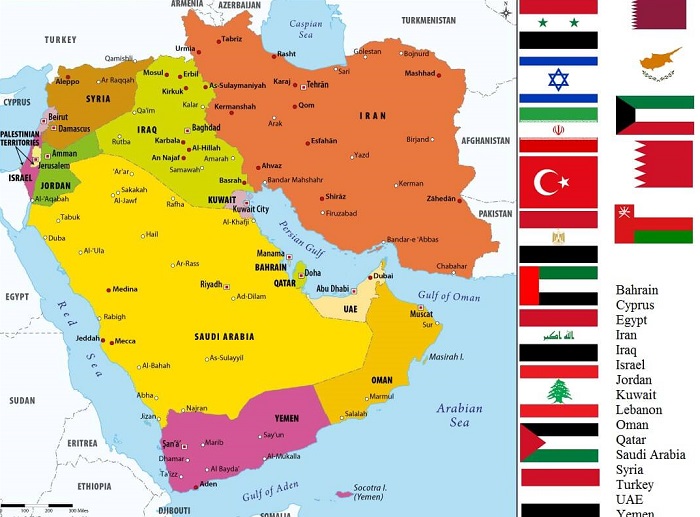The digital transformation market in the MENA (Middle East and North Africa) region reached $31.7 billion in 2021. With widespread digitization in industries such as BFSI (Banking, Financial Services, and Insurance), automation, healthcare, IT, and retail, the overall market size of digital transformation in MENA is expected to reach approximately $298.2 billion by 2032, with a compound annual growth rate (CAGR) of 22.7% from 2022 to 2032.
According to IDEA, countries like Saudi Arabia, the United Arab Emirates, Qatar, and Egypt have the largest share of digital transformation tools in the region. The IT and telecommunications industry follows BFSI and the healthcare sector in terms of market share.
Digital transformation is essentially a process where technologies like artificial intelligence, big data, cloud computing, and IoT (Internet of Things) are used to reshape or revolutionize products, processes, and technologies across all business sectors. Hence, we refer to the solutions, services, and advancements specific to the Middle East and North Africa as the digital transformation of MENA.
The MENA digital transformation market accounts for approximately 15% of the global digital transformation market. Due to various socio-economic and governance factors, countries in the Middle East have seen significant income fluctuations. However, we are currently witnessing the implementation of several government initiatives and substantial investments in digital transformation in this region.
Digital transformation encompasses various technologies such as cloud, automation, and the Internet of Things (IoT), which are employed in multiple industries to achieve various objectives. In some countries, including those in the Gulf Cooperation Council (GCC), government businesses play a significant role in digital transformation. Additionally, several international companies provide digital transformation solutions and services in this region, although their dominance has posed a barrier to the entry of new companies and increased competition.
It is expected that during the projected period (from 2022 to 2032), factors such as increased internet penetration, the need for innovation, cost reduction, and government support initiatives will contribute to the growth of the digital transformation market in MENA.
Furthermore, increased penetration of international digital technology providers in countries like the United Arab Emirates, Qatar, and Egypt will have a positive impact on the digital transformation trend in MENA over the next 10 years.
Comparison of the Digital Transformation Market in the MENA Region from 2017 to 2021 with the Outlook for 2022 to 2032
While the digital transformation in the MENA region grew at a compound annual growth rate (CAGR) of 18.9% from 2017 to 2021, it is expected that the CAGR for this market will increase to 22.7% from 2022 to 2032.
One of the positive drivers for this growth is the increase in the number of smartphone users in the region. According to the Wilson Center, internet usage in this region increased by 11% during the pandemic. During this period, investments in technology startups, especially fintech startups, also increased.
Furthermore, the development of 5G services has a positive impact on the digital transformation market in this region. People’s access to smartphones and the internet makes mobile and online communication more important for companies. According to 2021 data from McKinsey, the UAE and Saudi Arabia have the highest internet penetration rates in the region, and with a penetration rate of 70% in Egypt, this country has the highest growth potential in the region.

As a result, companies without the necessary technical expertise must collaborate with skilled companies to increase consumer engagement. Therefore, the expansion of digitalization and the greater use of advanced technologies such as artificial intelligence, cloud, and the Internet of Things contribute to the growth of the digital transformation market in the MENA region.
Which key trends are driving the digital transformation market in the MENA region?
According to joint research by Accenture and Microsoft, 80% of companies in the MENA region have embraced digital technologies to improve their business operations.
As a result, numerous companies, such as Amazon Web Services (AWS), the world’s largest cloud provider, have entered this market. AWS has three active bases in the UAE and is in the process of building a new cloud base in Israel.
Moreover, many companies have partnered and collaborated to provide cloud solutions in this region. For example, Saudi Aramco recently partnered with VMware for cloud computing operations.
The increase in internet users in this region has led companies to further enhance their digital activities to reach more customers. Advances in artificial intelligence and analytics have also allowed several digital transformation sellers to provide their solutions and services to customers in this region.
Why is the UAE considered a major digital transformation market?
The UAE government has taken multiple initiatives to improve digital governance. These digital solutions and services help the government build future environmental models and prepare for Industry 4.0.
5G technology is widespread in the UAE, and the internet penetration rate in this country is high. UAE-based companies are rapidly preparing for digital communication with their customers. These reasons have empowered the digital transformation in the UAE.
How will the digital transformation market grow in Qatar?
According to FMI consulting firm, it is expected that the digital transformation market in Qatar will grow at a CAGR of 22.1% from 2022 to 2032. Qatar’s digital transformation market owes its growth to leading digital transformation solution providers in the country, as well as the government’s collaboration with IT companies and the rapid industrialization.
According to Qatar’s Vision 2030, the country’s government is working to improve and modernize healthcare and education sectors. Given the government’s development plans, several companies have entered the market to provide digital transformation services and solutions to private and government entities in Qatar.
The Qatari government, in partnership with Microsoft, has initiated a National Empowerment Program to enhance digital skills for 50,000 citizens. Microsoft has also strengthened the country’s cloud capabilities by establishing cloud data centers in this region, further boosting Qatar’s cloud capacity.
Why is Egypt considered a lucrative market for digital transformation solutions?
According to the research company Future Market Insights, the digital transformation market in Egypt is one of the leading developments in the MENA region, with a compound annual growth rate (CAGR) of 24.3% from 2022 to 2032.
The rapid growth of the ICT industry, government support initiatives, and the increase in the number of digital transformation solution providers are among the key factors driving the rapid development of the Egyptian market.
According to ITIDA (Information Technology Industry Development Agency), the ICT industry is experiencing the highest growth rate in the country. Several international companies have started their operations in Egypt, and ICT exports from the country reached $4.5 billion in 2021.
Furthermore, the Egyptian government has plans to improve digital skills among its population and aims to create an ecosystem for public participation in innovation. This will significantly contribute to the growth of the digital transformation market in the coming decade.
Market Outlook by Segment
Which solution is most favored in consumer industries?
According to the FMI report, the Artificial Intelligence (AI) platform sector is expected to grow at the highest rate during this ten-year period, with a compound annual growth rate (CAGR) of 28.9%. One of the reasons for this significant growth is the use of AI platforms for time-saving and increased efficiency in consumer industries.
AI and automation are being applied across various industries and use cases. One of the main advantages is the automation of repetitive tasks. The advancement and development of AI enable not only increased task execution but also improved performance in terms of time and cost.
This contributes significantly to time and energy savings for companies. Increased productivity and reduced resource requirements through time, energy, and cost savings are helping companies, leading to the rapid adoption of AI platforms at a high growth rate during this ten-year period.
Why has cloud adoption become attractive in the MENA region?
Multiple advantages, including enhanced creativity and competitive advantages, have led many organizations to adopt cloud models. Consequently, most industries in the MENA region have prioritized cloud technologies among their digital transformation strategies.
Like other areas of digital transformation, government support initiatives are one of the reasons for the increased adoption of cloud technologies. Companies are establishing cloud regions and access points, and several digital transformation companies are offering services that facilitate the transition to the cloud. Therefore, cloud adoption is expected to grow at its maximum speed with a CAGR of 24.2% over the next ten years.
Why does the industry have the largest share of the MENA digital transformation market?
Communication industries require extensive infrastructure for their operations, and maintaining and monitoring such infrastructure can be challenging. Therefore, these industries are leveraging digital transformation and other technologies to enhance component performance and support better decision-making in finance, risk, and workflow processes.
The rapid growth of IT and telecom companies in the MENA region has resulted in increased demand for digital transformation solutions and services, and this trend is expected to continue in the coming decade. These solutions help improve services and capabilities in the communication industries. For this reason, it is expected that the IT and telecom industry will develop at the highest rate, with a CAGR of 29.5% over the next ten years.
Competitive Landscape
The growth of the MENA digital transformation market is primarily driven by government initiatives and several large companies striving to enhance their technological capabilities in this region. Key players in the region are also collaborating to provide digital transformation solutions and services to consumer industries. For example:
In April 2022, the First Abu Dhabi Bank (FAB) initiated cooperation with IBM from the United States to support digital transformation. IBM is set to strengthen the digital platforms of FAB in a hybrid cloud environment. As part of this collaboration, IBM is also responsible for improving the bank’s digital application and digital footprint.

In May 2022, the Abu Dhabi Department of Economic Development also signed a memorandum of understanding with the software company SAP to advance digital transformation. Both parties are expected to facilitate industrial innovation and digital transformation through this collaboration. Along with the development of advanced business models, they will support startups and small to medium-sized businesses in enhancing their digital capabilities.
Wipro, Exchanger Plc, and Microsoft are the largest digital transformation companies in the MENA region.
Wipro is an Indian multinational organization specializing in information technology, consulting, and business process outsourcing. The company offers consulting services in various areas, including cloud computing, cybersecurity, digital transformation, robotics, and artificial intelligence, to clients in 67 countries worldwide. Wipro has played a significant role in improving business development, innovation, and trust-building in the MENA region through automation, cloud, and digital technology. The company’s primary focus is on providing innovative solutions to address the complex needs of customers in the digital transformation process.
Wipro utilizes deep expertise in consulting, design, engineering, operations, and new technologies to achieve its ambitious goals and support sustainable and forward-looking businesses. In this regard, in April 2022, Wipro acquired Rizing Intermediate, a consulting company based in Connecticut, USA.
Accenture is another major provider of digital transformation platforms in the MENA region. This Irish-American company, headquartered in Dublin, specializes in information technology (IT) services and consulting. Accenture offers consulting services and products in the fields of management and technology to its clients. The company provides various capabilities and solutions to companies worldwide and has a network of collaborating companies in the fields of services, technology, outsourcing, and consulting.
Accenture also manages corporate operations on behalf of clients, including resource and procurement, accounting and financial matters, supply chain, marketing, and sales. Additionally, Accenture specializes in providing industry-specific services in various sectors, such as banking, trust platforms, security, insurance, and healthcare.
With various strategies, Accenture aims to increase its market penetration in the MENA region and boost its revenue share. For example, in 2020, Accenture launched the Dubai Tourism Innovation Center, its first innovation center in the Middle East and North Africa (MENA) region.
Investopedia Summit has also recently signed a memorandum of understanding with Accenture’s Middle East arm to leverage the company’s expertise in advanced technology.
Microsoft is a major technology giant based in Redmond, Washington, USA. The company specializes in software development, electronics, personal computers, and related services. Microsoft’s notable software products include the Office software suite, the Edge browser, and the Windows operating system. The company also has famous products like Xbox gaming consoles and Surface computers in its hardware division.
Following Microsoft’s entry into the MENA region, its solutions and services have gained high prominence in the Middle East and Africa. Microsoft also launched the Azure and Office 365 cloud platforms in the region in 2019 to support digital transformation initiatives of its customers.




No Comment! Be the first one.